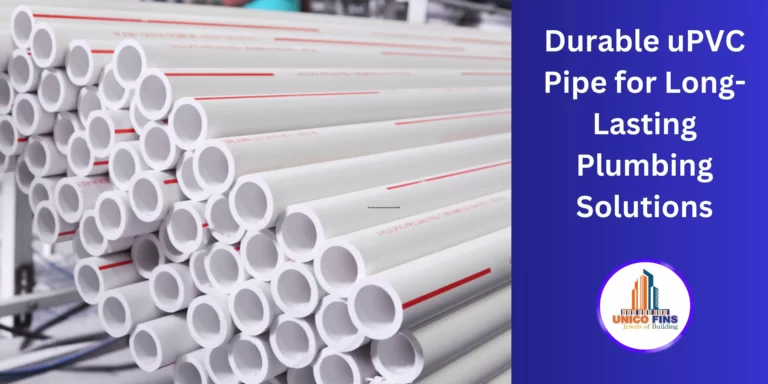In today’s world, where environmental consciousness is paramount, making the right choices for your plumbing needs is crucial. When it comes to plumbing, uPVC (unplasticized polyvinyl chloride) pipes have emerged as a leading eco-friendly choice. In this article, we’ll delve into the reasons why uPVC pipes are the sustainable solution for your plumbing requirements.
Understanding uPVC Pipes
In the world of plumbing, materials matter. This leads us to uPVC pipes, an acronym for unplasticized polyvinyl chloride. What sets them apart from conventional PVC pipes is the absence of plasticizers. They are renowned for their rigidity and non-toxic nature, making them the preferred choice for various applications. The absence of plasticizers, which are added to PVC to increase its flexibility, results in a stiffer and more durable material. This resilience makes uPVC pipes an excellent choice for plumbing systems, capable of withstanding pressure, temperature variations, and the test of time.
The Environmental Impact
In contrast to the eco-friendliness of uPVC, it’s essential to understand the environmental impact of alternative materials. Traditional piping materials, such as metals and concrete, have substantial carbon footprints due to resource-intensive manufacturing processes and transportation. They often require more energy to produce and maintain. On the other hand, uPVC pipes offer a sustainable solution, from their production to their installation and eventual disposal.
One of the primary reasons uPVC pipes are considered eco-friendly is their reduced carbon footprint. The manufacturing process for uPVC pipes consumes less energy and generates fewer greenhouse gas emissions compared to other materials. This is an important step in reducing the overall environmental impact of plumbing systems.
Energy Efficiency
Energy efficiency is a critical aspect of eco-friendliness, and uPVC pipes excel in this regard. The production of uPVC pipes consumes significantly less energy compared to other materials. Furthermore, once installed, uPVC pipes contribute to energy efficiency in the building itself.
The inherent properties of uPVC, such as its thermal insulation characteristics, reduce heat loss from the plumbing system. This leads to a more energy-efficient home, as less heat is wasted in the distribution of hot water. Ultimately, this not only saves energy but also reduces your energy bills.
Chemical Resistance and Reduced Water Contamination
Traditional piping materials can suffer from corrosion and chemical damage over time, which can result in water contamination. In contrast, uPVC pipes are highly resistant to these issues, making them an excellent choice for clean and safe water distribution.
Because of their corrosion resistance, uPVC pipes prevent the leaching of harmful substances into the water supply. This is especially important in areas where water quality is a concern. By choosing uPVC pipes, you’re taking a step towards ensuring that your water remains free from contamination.
Reduced Maintenance and Repairs
Another vital aspect of uPVC pipes is their durability, which translates to reduced maintenance and repair needs. Unlike some traditional materials that may require frequent upkeep or replacements, uPVC pipes can last for decades with minimal maintenance.
By choosing uPVC, you’re not only saving on maintenance costs, but you’re also contributing to resource conservation. Fewer repairs mean fewer resources are expended, aligning with the principles of sustainability and eco-friendliness.
Installation and Recyclability
The ease of installation is another noteworthy advantage of uPVC pipes. Their lightweight nature and simple jointing methods reduce installation time and costs, making them a convenient choice for plumbers and homeowners alike.
Furthermore, when the time comes to replace uPVC pipes, they are recyclable. This means that the materials used can be repurposed, reducing the need for new resources. Responsible disposal and recycling options are readily available, ensuring that uPVC remains a sustainable choice throughout its life cycle.
uPVC Pipes in Comparison to Other Materials
To fully appreciate the eco-friendliness of uPVC pipes, it’s essential to compare them to traditional materials such as metal and concrete. While these materials have their own merits, uPVC excels in sustainability and longevity.
In terms of sustainability, uPVC’s reduced environmental impact, energy efficiency, and resistance to water contamination make it a clear winner. Additionally, its versatility in various plumbing applications, from residential to industrial, positions uPVC as a highly adaptable and eco-friendly choice.
The Future of Eco-Friendly Plumbing
As the world becomes increasingly aware of the importance of sustainability, eco-friendly plumbing solutions are on the rise. Ushering in this future are uPVC pipes, standing at the forefront of the eco-friendly plumbing movement. By choosing uPVC pipes for your plumbing needs, you’re not only making a responsible choice for your property but also contributing to a greener and more sustainable world.
Conclusion:
In a world where sustainable choices matter more than ever, uPVC pipes have proven themselves as the eco-friendly option for plumbing. Their minimal environmental impact, energy efficiency, resistance to contamination, and reduced maintenance make them the clear choice for responsible homeowners and environmentally conscious builders. Embrace the future of plumbing with uPVC pipes and contribute to a greener, more sustainable world. Make the responsible choice for your plumbing and the environment by opting for uPVC pipes.



